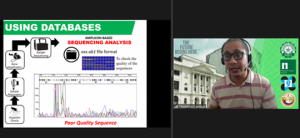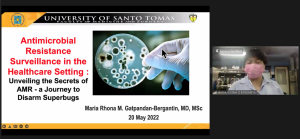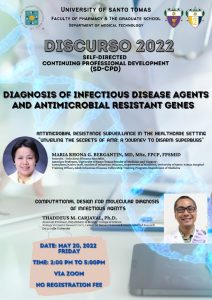UST Graduate School Ph.D. major in Medical Technology students, in collaboration with the Continuing Professional Development Committee of the Faculty of Pharmacy Medical Technology Department, held a webinar titled “Diagnosis of Infectious Disease Agents and Antimicrobial Resistant Genes” on May 20, 2022.



Experts in the field of infectious diseases and bioinformatics were invited to discuss some key and novel points regarding antimicrobial resistance contextualized in the Philippines, and the possible role of molecular and bioinformatics techniques in diagnostics of resistance.
Assoc. Prof. Maria Rhona G. Bergantin, M.D., M.Sc., FPCP, FPSMID of the UST Hospital discussed “Antimicrobial Resistance (AMR) Surveillance in the Healthcare Setting: Unveiling the Secrets of AMR – A Journey to Disarm Superbugs.” In this presentation, Bergantin focused on the mechanisms through which bacteria acquire antimicrobial resistance. She exposed the role of resistance networks on the transmission of AMR bacteria (ARB), as being driven by interactions among host, pathogen and environmental factors, including the role of hospital wastewater as a significant environmental reservoir of AMR, as it represents an ideal environment for ARB and antimicrobial resistant genes (ARGs) to persist. She also touched on the effects of antimicrobial resistance as a major issue posing a serious global health threat especially in low-income countries like the Philippines, and the treatment processes that can help in eliminating or reducing the ARB load and its impact on ARGs in a public health setting.
Assoc. Prof. Thaddeus M. Carvajal, Ph.D. of the De La Salle University College of Science, tackled the topic, “Computational Design for Molecular Diagnosis of Infectious Agents,” which highlighted cutting-edge research that brings an opportunity for current and future researchers to be abreast on the novel technologies and approaches in molecular studies with the aid of bioinformatics. He gave examples of his collaboration with Japanese agencies and academia in which molecular techniques including methods like Sanger sequencing and next generation sequencing, and the expanding of research from genomics to full on systematics were used to help with the prevention of mosquito-borne viral infections.
The webinar was attended by over 520 participants, including medical technologists/clinical laboratory scientists currently working in clinical laboratories in the Philippines, faculty members from different universities, Medical Technology students, and researchers in the field of Clinical Microbiology.
Also present during the program were Prof. Edilberto P. Manahan, Ph.D., Chair of the Department of Medical Technology and Prof. Camilla J. Vizconde, Ph.D., Assistant Dean of the UST Graduate School.




